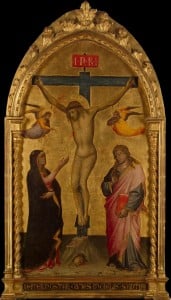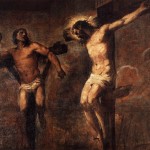When Jesus saw his mother and the disciple whom he loved standing beside her, he said to his mother, “Woman, here is your son.” Then he said to the disciple, “Here is your mother.” And from that hour the disciple took her into his own home.- John 19:26-27
If there was one thing I liked about last night’s Passion on Fox, it was that Mary (played by Trisha Yearwood) played a more prominent role than expected, singing four songs throughout the show. With that said, one thing I wish they showed was a scene where Jesus asks John to take care of his mother.
There is a lot of symbolism and a huge breach of tradition within this scene. For one thing, it proves that Jesus has no biological siblings because if he did, those biological siblings would’ve had the job of taking care of Mary after Jesus died. Another important thing is how Jesus addresses Mary. He calls her “Woman,” the same title he used at the Wedding of Cana.
I’m currently reading Venerable Fulton Sheen’s Life of Christ and the awesome archbishop spends three and a half pages meditating on this particular verse from the Gospel of John. By calling Mary “Woman” at the Wedding of Cana, Jesus is faced with the reality that after changing the water into wine, He will set Himself on the road to the Cross. In screenwriting terms, Mary acts as the herald, giving Jesus the call to adventure. By saying “Woman, what concern is that to you and to me? My hour has not yet come,” Jesus is acknowledging that eventually, his hour on the Cross will come and that Mary will be there with him.
When Jesus calls Mary “Woman” at the Cross, he acknowledges her as the New Eve, the new mother of all living. By giving her over to John, He gives her over to all his disciples and, by extension, us. In this small gesture, Jesus made Mary our mother.
Given that I did like aspects of last night’s Passion on Fox, the song I’m gonna share with you is the last one Trisha Yearwood sang as she held onto the illuminated cross:













